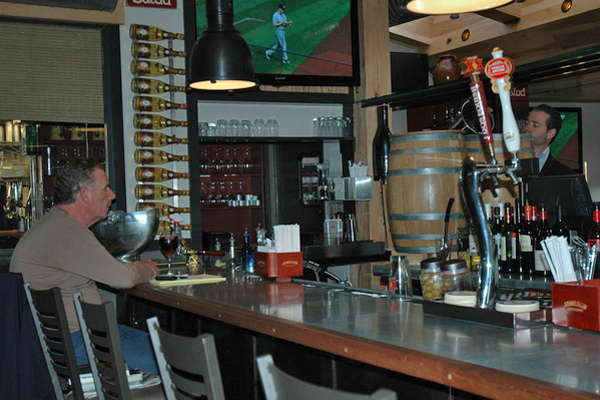
Though the name and most of the menu come from Spain, diners will taste a range of international influences in the food at Copa in Bridgehampton.
Copa is modeled after a traditional Spanish wine and tapas bar, and executive chef Eddy Phooprasert said in an interview this week that each item on the menu has his signature: “flavor, after flavor, after flavor.”
Born and raised in Thailand and educated at Le Cordon Bleu in France, Mr. Phooprasert said he puts his own spin on each traditional dish, like the ginger aioli sauce on ham croquetas, a Serrano ham mixture that’s breaded and fried, $10; and the basil-herb oil and chili sauce drizzled over a tortilla Spanish omelet of egg, potato, Serrano ham, chorizo, onion and peppers, $9.
“Anytime someone comes in and has my food, you take a bite and you taste one thing right away,” he said. “But then you realize there are four or five other things lingering on your palate. It’s flavor in layers.”
The menu has a large variety of tapas, from $8 to $22, salads, and entrées of seafood and meat dishes, including a pan-seared wild king salmon, $31, and rib-eye steak, $39. To provide diners with a real Spanish experience, there are also tastings of cured meat, $28, and cheeses, $24, which Mr. Phooprasert said have been gaining popularity.
Owners Cosmo Venneri and Chris Boudouris opened Copa in July when Mr. Boudouris, who owns McNamara’s Liquors in Bridgehampton Commons, noticed that the space was open. Mr. Venneri, who has owned Austin’s, a steakhouse in Brooklyn for three years, and has also owned nightclubs in Brooklyn, said he came to look at the space and thought it was perfect.
Mr. Venneri and Mr. Boudouris went to Barcelona, Spain, to learn more about the country’s philosophy of serving tapas, appetizer-size portions, instead of large meals, and decided it was the right strategy for their Bridgehampton restaurant.
“We wanted to be current with the food trends and people are being very health conscious now,” he said. “Tapas have become more popular because people don’t want to sit down and have these huge meals.”
The idea at Copa is for more communal dining, said Mr. Venneri, so diners tend to order four or five tapas and everyone at the table shares. The restaurant has tables set up for parties of four or five and large booths and high tables with stools for larger parties of six to eight.
“It’s all set up to accommodate a lot of people,” Mr. Venneri said.
Mr. Venneri said he and Mr. Boudouris wanted the restaurant’s decor to be simple and inviting with a country feel. The floor and ceiling are wood paneled, the walls are two-tone in earth colors, and the lights are kept low. For the same reason, he said, there isn’t much wall decoration. Where there aren’t windows, which are floor to ceiling in the front of the restaurant, the walls are mostly bare except for a few large mirrors and one giant, white bull’s head, which protrudes over a table. Empty wine bottles are also used as decoration along a wall lined with windows, set up on a high shelf and illuminated with track lighting.
The most popular dishes on the menu, said Mr. Phooprasert, are the tortilla and the paella, another traditional dish blending rice and other ingredients that he makes two ways: paella de langosta, $75, is made with lobster, seafood and chorizo; and paella Valenciana, $45, is made with chicken and chorizo.
Mr. Phooprasert said the lamp chops, from domestic lamb that has a more mild flavor, marinated in Spanish paprika are another popular choice.
The menu also features three types of Spanish flatbreads, or cocas, all $16: One is made with beef short ribs, apple-smoked bacon and a horseradish crème; one with artichokes, mushrooms, black truffles and manchego cheese; and one with chicken, onions, peppers, garlic, basil and manchego. Mr. Phooprasert said he recommends the chicken flatbread, which uses pimento peppers, the less spicy, roasted bell peppers popular in Spain, roasted tomato sauce and Spanish almonds, which he said are larger, and have a more buttery, nutty taste than traditional almonds.
Not everything on the menu is strictly Spanish. Madre albondigas, $13, which means mother’s meatballs in Spanish, are Italian-style meatballs prepared from a secret recipe from Mr. Venneri’s mother, he said.
Also concocted from a secret recipe, he said, are the two sangrias, white and red, drawn from spouts on two large wooden barrels at the end of the bar.
The large, wooden, rectangular bar in the middle of the restaurant is also an important feature of Copa, where more than 40 bottles of wine by the glass and more than 100 by the bottle are served, Mr. Venneri said. By the bottle, the wines range in price from $30 to $500, he said.
Mr. Venneri said he hopes Copa will become a late-night staple in the area—the bar is open until 3 a.m. daily. He said the kitchen closes at 11 p.m. Sunday through Thursday and at 12 a.m. on Fridays and Saturdays, but that the late-night menu is available until close every day.
The late-night menu includes some of the tapas on the regular menu, like croquetas and albondigas, and also caters to the late-night crowd with French fries and hamburgers.